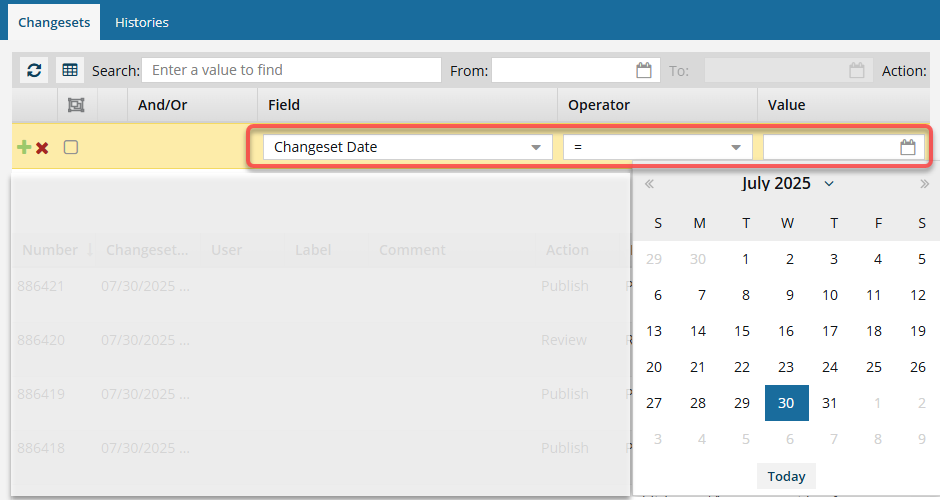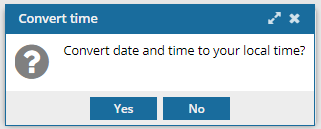You can search the changeset list to find records that were created on a specific day. The default format for dates is MM/DD/YYYY HH:MM:SS AM/PM. For example, 07/29/2025 7:38:25 AM.
 Before you begin
Before you begin

 Tips and tricks
Tips and tricks
- In Advanced search, you cannot choose a date range.
- You can select an operator to show all records older than a date or more current than a date.
- If you need to specify a specific date range, go to the basic search tools bar and use the From and To and fields. Keep in mind that if a range is too large, it will take some time to see results.
 Search changesets by dates
Search changesets by dates
- For steps to find a changeset using specific criteria, refer to the following topics:




To find changesets by date using Advanced Search:
-
From the top menu options, select the
 Changesets module.
Changesets module.
-
If not open, select the Changesets tab.

You cannot open advanced search on the
Histories tab.
-
On the Changesets tab, select
 Advanced search.
Advanced search.
 Result: a new pane opens in between the basic search bar and the changeset list.
Result: a new pane opens in between the basic search bar and the changeset list.

-
In the Field list, select Changeset Date.
-
In the Operator list, select one of the following:
- = (Equals): show only changeset records that have the exact date you enter or select in Value
<> (Not Equal to): show all changeset records that do NOT have the exact date you enter or select in Value> (Greater than): show all changeset records that are more current than the date you select in Value>= (Greater than or equal to): show all changeset records that have the same date or are more recent than the date you select in Value< (Less than): show all changeset records that are older than the date you select in Value<= (Less than or equal to): show all changeset records that have the same date or are older than the date you select in Value
-
In the Value list, do one of the following:
- Select
 the Calendar icon to choose a date.
the Calendar icon to choose a date.
- Enter a date. The default format is MM/DD/YYYY. For example, 07/16/2025.
-
Optionally, you can revise your search criteria:
-
Click
 Add to add another search parameter.
Add to add another search parameter.
-
Click
 Remove to remove a search parameter.
Remove to remove a search parameter.
-
If you have multiple parameters in the query, choose the appropriate criteria from the And/Or list.
-
To group search parameters, select the checkboxes for two or more consecutive parameters and click Group selected clauses.
-
To ungroup search parameters, click
 Ungroup clauses.
Ungroup clauses.
-
Verify the search parameters for your query and then click
 Search.
Search.

 Result: You see a list of changesets that match your criteria.
Result: You see a list of changesets that match your criteria.
-
To save the list of components that match the search as a CSV file:
-
Click
 Save as CSV.
Save as CSV.
-
To choose what time zone is used, on the Convert time confirmation screen, select one of the following:
 You see the date displayed in the header of the CSV as: All date/times are shown in {timezone} or UTC.
You see the date displayed in the header of the CSV as: All date/times are shown in {timezone} or UTC.
UTC is a time zone standard used as a basis for all time zones worldwide. It is a constant time scale and does not change for Daylight Saving Time.

- To use your local time, click Yes.
- To use UTC time, click No.

 Result:
Result: 
 If the list of changesets contains more than 200 records, only the first 200 are saved to the CSV file.
If the list of changesets contains more than 200 records, only the first 200 are saved to the CSV file.
- You see a file is downloaded to your computer using the following format:
- InspireChangesets_DD-MM-YYYY-HH-MM-SS-MS
- If you searched for a change, Inspire now saves only your search results to the CSV file.
- If you filtered the list, Inspire now saves your filtered list to the CSV file.
- If you sorted the list, Inspire now saves your sorted list to the CSV file.
 Before you begin
Before you begin Advanced search is available only on the Changesets tab. You cannot open Advanced search on the Histories tab.
Advanced search is available only on the Changesets tab. You cannot open Advanced search on the Histories tab.
 Tips and tricks
Tips and tricks Search changesets by dates
Search changesets by dates




 You cannot open advanced search on the
You cannot open advanced search on the  Result: a new pane opens in between the basic search bar and the changeset list.
Result: a new pane opens in between the basic search bar and the changeset list.
 the Calendar icon to choose a date.
the Calendar icon to choose a date.


 Search.
Search.


 You see the date displayed in the header of the CSV as: All date/times are shown in {timezone} or UTC.
You see the date displayed in the header of the CSV as: All date/times are shown in {timezone} or UTC.
